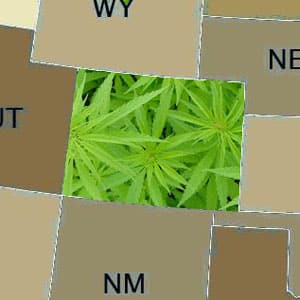When Colorado voters last November gave the thumbs up to marijuana legalization, the celebrations came quickly, with overjoyed pot smokers triumphantly lighting up, even though the pot laws had yet to officially change. Indeed, in following the will of the voters, Gov. John Hickenlooper (D) within weeks announced that marijuana was no longer illegal in Colorado.
But that was only the beginning. Amendment 64, the marijuana legalization initiative approved by the voters, didn’t just legalize marijuana — it also called on the state to come up with a regulatory regime for legal marijuana commerce. That process is now well underway, with the state legislature currently considering implementation legislation.
The legislature is working on a framework crafted by a Hickenlooper-appointed Amendment 64 Implementation Task Force, which in mid-March released its Final Report with 58 discrete recommendations for the legislature to consider. The highlights included:
- The adult-use marijuana industry should be required to have common ownership from seed to sale. This vertical integration regulatory model means that cultivation, processing and manufacturing, and retail sales must be under common ownership.
- During the first year of licensing, only entities with valid medical marijuana licenses should be able to obtain licenses to grow, process and sell adult-use cannabis.
- A new Marijuana Enforcement Division in the Department of Revenue would be funded by General Fund revenue for the next five years and would provide the necessary regulatory oversight of all marijuana industries in Colorado.
- Refer a ballot initiative to voters this November for a 15% excise tax, with the first $40 million of excise tax proceeds going to the state’s school construction fund as outlined in Amendment 64, and a “marijuana sales tax” to create funding sources to cover the costs of regulating the industry, implementing consumer safeguards and establishing youth prevention and treatment programs.
- Only Colorado residents should be allowed to hold licenses to grow, process and sell adult-use cannabis. But sales to both residents and visitors to the state should be permitted, with stricter quantity limits for visitors.
- All types of marijuana sold from adult use cannabis retail facilities should be in child-proof packaging and have warning labels that detail tetrahydrocannabinol (THC) potency and list all pesticides, herbicides, fungicides and solvents used in cultivation or processing.
Other recommendations included not allowing pot smoking in bars or other facilities impacted by the state’s anti-smoking laws, barring “open containers” of marijuana in vehicles, and requiring people with children at home to keep their marijuana gardens secure.
“This is a very comprehensive report, developed in a rapid timeframe, that lays the groundwork for the establishment of a robust regulatory framework, with adequate funding for marijuana industry oversight and enforcement, consumer protection and prevention and treatment programs for young people,” said Task Force co-chair and governor’s legal counsel Jack Finlaw. “The Task Force recommendations will now need to be perfected through the legislative process and rulemakings by various state agencies.”
While there is some quibbling over the various recommendations and some concerns about what the legislature might do, Amendment 64 proponent (and now Marijuana Policy Project communications director) Mason Tvert said things were going pretty much as expected.
“The goal is to establish regulated retail stores that provide marijuana to adults, and we are steadily moving toward that,” he said. “There are obviously lots of details to be worked out, and lots of different opinions on those details, but overall, we’re moving in the direction of accomplishing our goal. There is debate over vertical integration, whether sales should be restricted to non-residents, the levels of sales tax — these are all important issues, but overall things are going well, and we’re well on our way to having a system of regulated marijuana cultivation and sales in Colorado.”
Now, the Task Force recommendations are before a joint legislative committee charged with turning them into regulatory legislation. The committee had hoped to be done by the end of March, but progress has been slow, and the new deadline date is next week. If the committee meets that deadline, that will give the legislature as a whole exactly one month to craft and pass enabling legislation before the session ends.
The politicians are doing what they are supposed to do, said Tvert. There have been no real attempts to sabotage the will of the voters, and legislators are trying with good faith to implement Amendment 64.
“Generally, elected officials have been responsive,” he said. “There have been some proposals for restrictions, but overall, they are moving forward to pass this. There is really nothing else they can do. For most Coloradans, this is going exactly as planned. For people in the industry, for advocates, for elected officials, there are lots of details being debated and it can feel like there’s a lot of drama, but overall, everything’s happening as it’s supposed to.”
The clock is ticking in Colorado. The voters have already voted to legalize marijuana. Either the legislature passes regulations to implement it — and quite possibly puts anticipated taxes on the ballot, as required by state law for any new taxes — and Colorado has legal, taxed and regulated marijuana commerce, or it simply has legal marijuana possession with no taxes and no regulations. The threat of the latter should be enough to ensure the success of the former.
Article From StoptheDrugWar.org - Creative Commons Licensing - Donate









